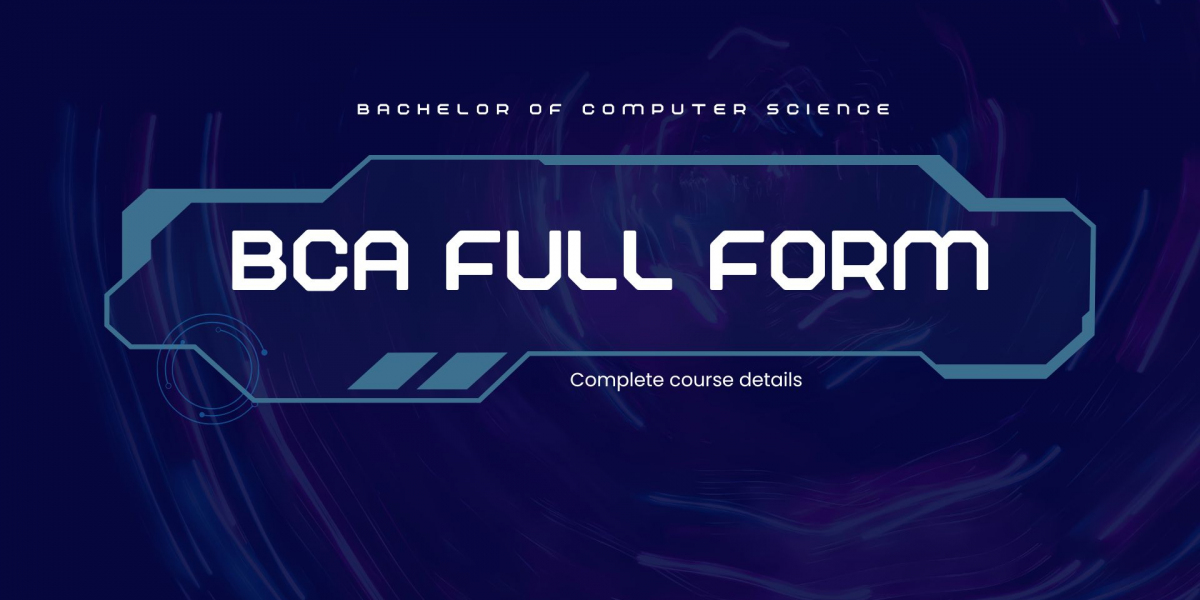Pursuing a BCA degree (Bachelor of Computer Applications) is an exciting journey for students who are eager to make their mark in the technology and IT industries. The BCA full form signifies a comprehensive undergraduate program that equips students with the skills and knowledge necessary to excel in various IT roles, such as software development, web development, network management, and much more. While the program is rewarding, it can also be challenging if you don’t approach it with the right mindset and strategies. This article will guide you on how to succeed in your BCA program by offering practical advice, study tips, and a roadmap for achieving excellence throughout your academic journey.
1. Understand the BCA Full Form and What It Entails
Before diving into the specifics of how to succeed in your BCA program, it is important to understand what a BCA degree really stands for. BCA is the Bachelor of Computer Applications, which is a three-year undergraduate degree that focuses on imparting knowledge related to computer science, programming, software development, databases, networking, and other essential IT fields. This program prepares you for a variety of careers in the tech industry, including positions such as software engineer, system analyst, web developer, network administrator, and data scientist.
The first step to success in a BCA program is understanding the curriculum, which usually includes subjects like programming languages (C, C++, Java, Python), database management, software engineering, web technologies, operating systems, and networking fundamentals. Having a clear understanding of what lies ahead will help you stay motivated and focused throughout your studies.
2. Time Management: Balancing Studies and Personal Life
One of the key factors in succeeding in a BCA program is effective time management. You will be dealing with various assignments, projects, exams, and practical sessions, all of which require dedicated time and attention. In addition, you will need time for revision, research, and hands-on practice. It is essential to plan your day, prioritize your tasks, and ensure you are balancing academic work with personal time.
Here are some time management tips:
- Create a study timetable: Set specific times for studying each subject and stick to them.
- Break tasks into smaller chunks: Large assignments can seem overwhelming, but breaking them into smaller tasks makes them more manageable.
- Set realistic goals: Be clear about what you want to achieve each week or month, and make sure you’re realistic about how much time you can dedicate.
- Avoid procrastination: Stay disciplined and avoid the temptation to delay tasks. Procrastination only adds stress and hampers your academic performance.
Effective time management will not only help you succeed academically but also ensure you have enough time for your personal interests and relaxation.
3. Focus on Building Strong Fundamentals
A solid foundation in computer science and IT is essential to succeeding in a BCA program. The BCA curriculum includes subjects that might seem complex at first, but focusing on building strong fundamentals will make them much easier to understand. Subjects like data structures, algorithms, programming languages, and operating systems are crucial to your future career in IT. Without a firm understanding of these topics, it will be difficult to keep up with more advanced concepts.
Tips to master the basics:
- Master programming languages: Learning programming languages such as C, Java, or Python is central to your BCA program. Spend extra time practicing coding problems and building simple projects.
- Understand data structures and algorithms: These are the building blocks of computer science. Study data structures like arrays, stacks, queues, linked lists, and trees, as well as algorithms like sorting and searching.
- Practice problem-solving: IT is all about solving problems. Work on coding challenges, online tutorials, and projects to develop your problem-solving skills.
- Don’t skip theoretical concepts: While coding is essential, understanding the theoretical concepts behind the code will help you in practical applications.
A deep understanding of these core topics will make it easier to grasp advanced subjects and set you up for a successful career.
4. Practice Hands-On Skills
While theoretical knowledge is important, it’s hands-on practice that will help you gain practical skills and become proficient in computer applications. Your BCA program includes many opportunities for practical learning, from lab sessions to projects. Taking full advantage of these opportunities will give you the experience needed to succeed.
Here’s how you can build practical skills:
- Work on projects: Start small and gradually work on more complex projects. Creating applications, websites, or databases will not only improve your skills but also enhance your resume.
- Participate in internships: If possible, take internships during your BCA program to gain real-world experience. Internships can help you apply the knowledge gained in the classroom to solve real business problems.
- Learn new technologies: Don’t limit yourself to just the subjects taught in the classroom. Explore emerging technologies such as Artificial Intelligence (AI), Machine Learning (ML), Cloud Computing, and Blockchain to stay ahead of the curve.
- Contribute to open-source projects: Contributing to open-source projects can help you learn from other developers, improve your coding skills, and build a professional network.
Hands-on practice is essential for mastering programming, debugging, and software development, and it will prepare you for the challenges you’ll face in the IT industry.
5. Stay Updated on Industry Trends
The world of technology is evolving at a rapid pace. New programming languages, frameworks, tools, and technologies are emerging every year. To be successful in your BCA program and your future IT career, it’s important to stay updated on the latest industry trends.
Ways to stay informed:
- Follow tech blogs and websites: Stay updated by reading blogs, news, and articles related to computer science and IT. Websites like TechCrunch, Stack Overflow, and GitHub provide valuable insights.
- Attend webinars and conferences: Participating in online webinars or attending tech conferences will expose you to the latest developments in the tech industry and give you the chance to interact with professionals.
- Take online courses: Platforms like Coursera, Udemy, and edX offer courses on emerging technologies. These courses can help you expand your knowledge and stay competitive in the job market.
By staying updated, you will be better equipped to take advantage of new opportunities and trends in the IT sector.
6. Network with Peers and Professors
Networking is another critical factor in your success during the BCA program. Building relationships with your professors, classmates, and industry professionals can open doors to opportunities, help you with doubts, and even lead to job offers after graduation.
Here are some networking tips:
- Engage with your professors: They can offer valuable insights, help you with difficult concepts, and even recommend career opportunities.
- Collaborate with classmates: Group projects and study groups can be incredibly beneficial. Working with others helps you learn different perspectives and improves your teamwork skills.
- Join tech communities: Participate in tech forums, coding competitions, and community events to meet other aspiring IT professionals.
Building a strong network during your BCA program will be crucial for your future success.
7. Focus on Personal Development
Success in your BCA program isn’t just about academics and technical skills. It’s also about personal development. Being disciplined, having a growth mindset, and learning soft skills are important to thriving in the IT industry.
Personal development tips:
- Develop problem-solving skills: IT professionals are problem-solvers. The more you practice solving problems, the better prepared you’ll be for a career in IT.
- Improve communication skills: Good communication is crucial in any career. Work on both your written and verbal communication skills, especially when explaining technical concepts to non-technical audiences.
- Stay organized: Keeping track of assignments, deadlines, and projects will help you stay on top of your academic responsibilities.
- Stay motivated and focused: There will be times when you feel overwhelmed. Stay motivated by setting clear goals, celebrating small achievements, and maintaining a positive attitude.
Focusing on your personal growth will help you stay resilient and succeed in the BCA program.
Conclusion
In conclusion, succeeding in your BCA degree requires a combination of dedication, discipline, and strategic planning. The BCA full form — Bachelor of Computer Applications — equips students with the tools needed to succeed in the fast-paced IT industry. By understanding the curriculum, managing your time effectively, mastering the fundamentals, practicing hands-on skills, staying updated, and networking, you can set yourself up for success.
Remember, success doesn’t come overnight, but with consistent effort, focus, and the right approach, you’ll be well on your way to achieving your goals and starting a rewarding career in IT.
FAQs
What is the full form of BCA?
- BCA stands for Bachelor of Computer Applications, a degree program focused on computer science and IT.
How can I manage my time effectively during the BCA program?
- Create a study timetable, break tasks into smaller steps, set achievable goals, and avoid procrastination.
What skills will I develop during a BCA program?
- You’ll develop skills in programming, problem-solving, software development, web technologies, database management, and networking.
Are internships important for BCA students?
- Yes, internships provide hands-on experience, allowing you to apply your knowledge in real-world scenarios and build a professional network.
Can I pursue higher studies after completing a BCA degree?
- Yes, after completing a BCA, you can pursue a Master of Computer Applications (MCA), or certifications in specialized fields like data science or machine learning.









